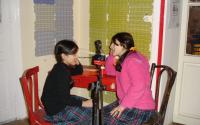22 August 2005
Searing heat and drought are affecting large swathes of southern Europe and North Africa.

Water-rationing is in place across more than half of France, with the west particularly affected by drought. Measures range from bans on washing cars to limits on farmers watering crops. Cereal production may be badly hit.
A plague of locusts in the south of France, around Aveyron, has been put down to the continuing dry, hot weather.
The authorities are keen to prevent a repeat of the 15,000 premature deaths blamed on the 2003 heatwave. A register has been set up of vulnerable elderly people in large towns.
A hidden cache of World War II gunpowder surprised firefighters when it ignited as a forest fire swept through woodland in the Var region, according to the Associated Press. No one was injured in the explosions.
The fire, which was contained on 5 August, had forced about 1,500 people to leave their homes for safety and scorched around 250 hectares of land.
Two pilots died on 20 August when their firefighting aircaft crashed in the Ardeche, in south-eastern France. It is the third incident involving firefighting aircraft in a month.
On 1 August, two Canadair pilots died when their plane crashed in Corsica. In July, a pilot escaped uninjured when his plane crashed in the Var region.
Spain is suffering its worst drought since records began in 1947, with the east particularly badly hit. Temperatures have risen to 40C (104F) in parts of Andalucia, in the south. A wave of forest fires has destroyed hectares of tinderbox woodland.
The Spanish government has declared the area affected by the fire in Guadalajara, which killed 11 volunteer firefighters, a "natural disaster zone".
Around 13,000 hectares of forest was destroyed in the blaze that is thought to have been started by a barbecue. Across the country around 95,000 of forest have been hit by fires this year.
Measures to prevent further tragedies have already been introduced, such as the banning of fires outside, and more are planned.
Arsonists have been blamed for fires that have affected the north-western region of Galicia. Dozens of fires were started in the Pontevedra and Ourense regions on 20 August - with around 20 still blazing on Sunday. A firefighter has been arrested on suspicion of starting some of the fires.
 Villagers in Spain have fought fires with whatever means possible |
Water is also being rationed across half the country, including in major tourist centres. Farmers are demanding emergency help as crops fail and parched pastures no longer sustain livestock.
The European Commission is taking steps to help beat cereal shortages caused by the drought in Spain and Portugal.
Surplus cereals in Germany, Austria, Poland, France, Hungary and Slovakia are being sold to Spain and Portugal at market rates (500,000 tons to Spain and 200,000 to Portugal).
The maize, wheat and barley will be used, among other things, to feed starving livestock.
The Commission has also allowed money earmarked for rural development to be used to alleviate the effects of the drought.
Under Spain's heatwave plan, the authorities will alert the elderly, infirm and those with young children by text message if temperatures rise to dangerous levels.
Portugal is facing its worst dry spell since the 1940s. Some 97% of the country has suffered a severe or extreme drought, ministers say.
Shortages are particularly acute in the Algarve region, where the population more than doubles during the peak tourist season. The government is urging water-saving measures.
 The fires across Europe come as countries suffer high temperatures |
The European Commission is allowing 200,000 tons of surplus cereals from eastern Europe to be sold to Portugal at market rates.
Brush fires are continuing to rage in northern and central Portugal.
Fires have destroyed 140,000 hectares of forest this year and left at least 15 people dead, including 11 firefighters.
On 21 August, Spain, France, Italy and Germany responded to an appeal for help from Portugal. They sent firefighting experts, water-dropping planes and helicopters to help tackle more than 27 blazes raging across the country.
Portugal's Interior Minister Antonio Costa said the country could not cope on its own.
Months of drought, high temperatures and strong winds have made the situation worse.
People in rural parts have been asked to clear an area of 50 metres around their homes as a safety precaution.
A heatwave which has seen temperatures climb to 50C has claimed more than a dozen lives in Algeria. Forest fires have broken out across swathes of the country.
Drought is putting crop production by some 2.5 million farmers at risk. Authorities may have to step up imports to feed people and livestock.
The temperature has topped 35C (95F) in cities including Milan, Florence and Turin. Several people have died in northern Italy as a result of the intense heat.
Freak swarms of locusts are reported to have devoured vineyards in and around the northern mainland province of Alessandria.
The country's crops, especially cereals, are at risk from water shortages.
Italy's health ministry is urging local authorities to check on elderly citizens by telephoning or visiting those who could be at risk. A free hotline provides advice on how to manage the heat.
Greece
The Greek government has announced cash rewards up to 100,000 euros (£69,582) for information leading to arsonists believed responsible for a series of forest fires, AFP news agency reports.
In July, fires fanned by strong winds destroyed hundreds of hectares of forest and scrub.
Several buildings near the port of Rafina, 30km north-east of Athens, were also destroyed.






